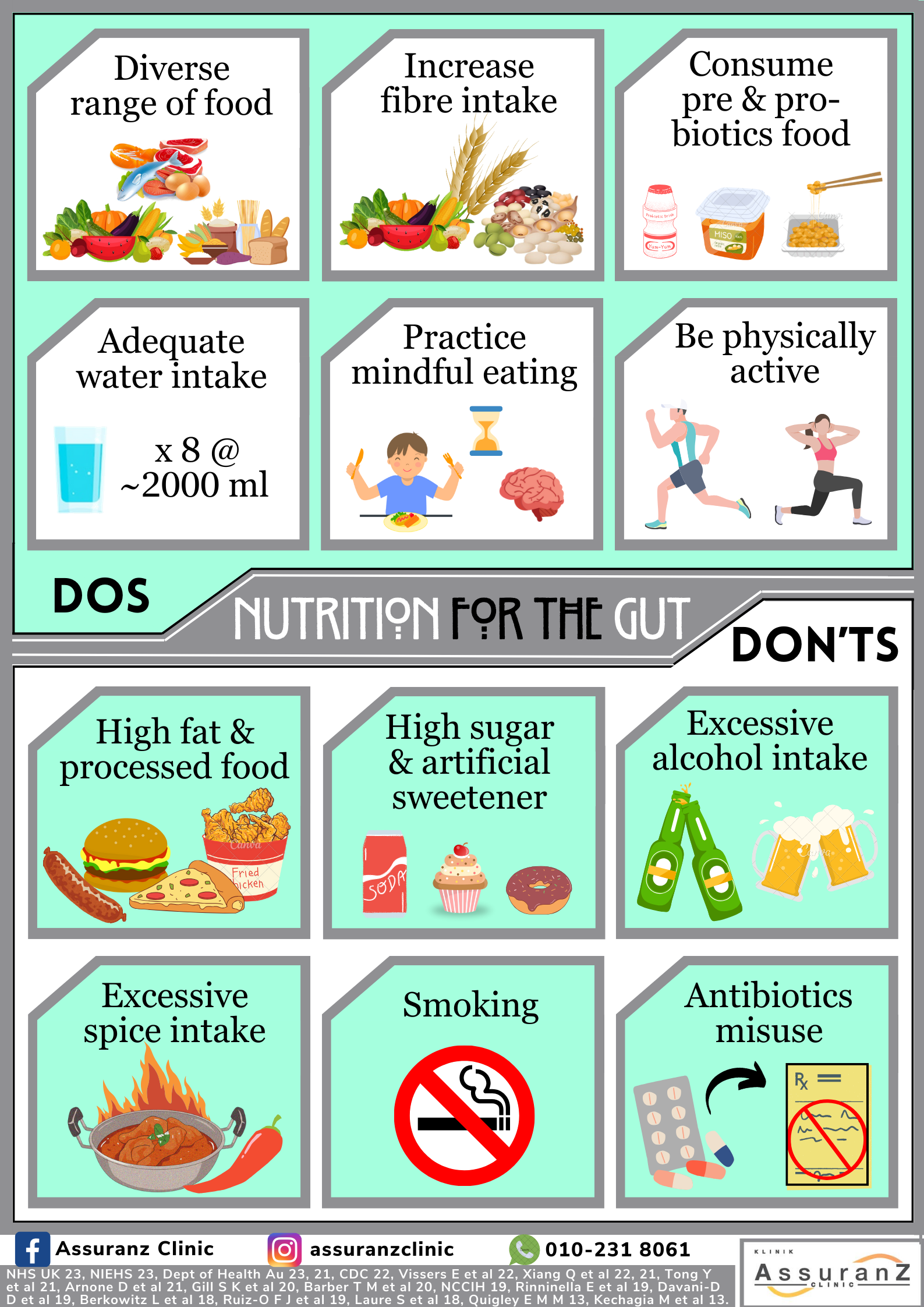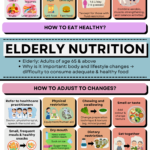Our digestive system is responsible for the breakdown of food into smaller chemical components to be absorbed by the body for energy production, cell repair, and growth. The digestive system is made up of the gastrointestinal (GI) tract consisting of the oral cavity, pharynx, oesophagus, stomach, intestine, and anus. Although there is no precise definition of gut health, generally it pertains to the positive aspects of the GI tract such as the effectiveness of digestion and the absence of illness.
我们的消化系统负责将食物分解成较小的化学成分,以供人体吸收以产生能量、细胞修复和生长。消化系统由胃肠道(GI)组成,包括口腔、咽、食道、胃、肠和肛门。尽管肠道健康没有准确的定义,但通常它与胃肠道有关,例如消化的有效性和没有疾病。
The health of our gut depends on the gut microbiota (GM). In the human GI itself, there are approximately 300 to 500 bacterial species. The GM’s composition is shaped in early life depending on infant transitions (i.e. birth mode, gestational date et cetera) and remains relatively stable in adulthood. However, it can be altered based on other factors such as body mass index (BMI), physical activity, and dietary intake. While there is no specific measure of gut health, unhealthy gut might present with signs, which are digestive symptoms (i.e. diarrhoea, acid reflux et cetera), sluggishness, fatigue, poor sleep quality, emotional disturbance, frequent contraction of infectious illness, and sudden weight loss or gain.
我们肠道的健康取决于肠道微生物群 (GM)。在人类胃肠道中,大约有300至500种细菌。微生物群的组成在生命早期根据婴儿的转变(即出生方式、妊娠日期等)而形成,并在成年后保持相对稳定。然而,它可以根据其他因素进行改变,例如体重指数 (BMI)、体力活动和饮食摄入量。虽然没有具体的衡量肠道健康状况的指标,但肠道不健康可能会出现一些症状,包括消化系统症状(如腹泻、胃酸反流等)、呆滞、疲劳、睡眠质量差、情绪紊乱、传染病频繁发作以及突发性腹泻等、体重突然减轻或增加。
Research on this topic is still ongoing, but it appears that GI health plays crucial roles in overall health. It has been found that gut health is associated with the immune system, mental health, gastrointestinal disorders, endocrine disorders, cardiovascular disease, cancer, sleep, and autoimmune disease. Therefore, it is important to ensure that our gut health is optimal at all times. Although some factors cannot be controlled, making changes to our dietary and lifestyle habits can improve GI health. Here are some tips:
关于这一主题的研究仍在进行中,但胃肠道健康似乎在整体健康中发挥着至关重要的作用。研究发现,肠道健康与免疫系统、心理健康、胃肠道疾病、内分泌失调、心血管疾病、癌症、睡眠和自身免疫性疾病有关。因此,确保我们的肠道健康处于最佳状态非常重要。尽管有些因素无法控制,但改变我们的饮食和生活习惯可以改善胃肠道健康。以下是一些提示:
The dos / 该做的:
- Balanced and diverse range of food / 均衡且多样化的食物
Balanced meal with a variety of food types including vegetables and fruits will provide all essential nutrients for the gut including vitamins and minerals. Food diversity can enhance microbiome diversity in the gut.
含有蔬菜和水果等多种食物的均衡膳食将为肠道提供所需的营养素,包括维生素和矿物质。食物多样性可以增强肠道微生物组的多样性。
- Increase fibre intake / 增加纤维摄入量
Fibre, which can be obtained through the consumption of wholegrains, legumes, vegetables, fruits, seeds, and nuts has various benefits. These include prevention of diarrhoea, constipation, and associated problems such as haemorrhoids by bulking the stools, reducing transit time et cetera. Fibre also helps to increase microbiota viability and diversity and may prevent colorectal cancer.
纤维可以通过食用全谷物、豆类、蔬菜、水果、种子和坚果获得,且具有多种好处。这些好处包括通过增加粪便量、减少排便时间等来预防腹泻、便秘和痔疮等相关问题。纤维还有助于增加微生物群的活力和多样性,并可能预防结直肠癌。
- Consume prebiotics-containing food / 食用含益生元的食物
Prebiotics can be helpful for the gut bacteria, as they stimulate and increase the activities of these healthful bacteria. They are found in some dietary products such as vegetables (asparagus, garlic, onion, guar beet, leek et cetera), wholegrains (barley, rye, wheat, oat), human and cow’s milk, honey, legumes (peas, lentils et cetera), nuts (pistachio, cashew, almond et cetera) honey, and seaweed.
益生元对肠道细菌有帮助,因为它们刺激和增加这些健康细菌的活性。它们存在于一些膳食产品中,例如蔬菜(芦笋、大蒜、洋葱、瓜尔甜菜、韭菜等)、全谷物(大麦、黑麦、小麦、燕麦)、人奶和牛奶、蜂蜜、豆类(豌豆、扁豆等)、坚果(开心果、腰果、杏仁等)、蜂蜜和海藻。
- Consume probiotics-containing food / 食用含益生菌的食物
Probiotic bacteria may help the body to maintain a healthy community of microorganisms. It can prevent and treat antibiotics-associated and infectious diarrhoea. Sources of probiotics are kefir, yoghurt, kombucha, fermented vegetables (such as sauerkraut and kimchi), tempeh, natto, miso and cheese.
益生菌可以帮助身体维持健康的微生物群落。它可以预防和治疗与抗生素相关的腹泻和感染性腹泻。益生菌的来源有开菲尔、酸奶、康普茶、发酵蔬菜(如酸菜和泡菜)、豆豉、纳豆、味噌和奶酪。
- Adequate water intake / 充足的饮水量
Water is needed to remove wastes through bowel movement and aids in food break-down. Water also assists with softening stools, helping to prevent constipation. On the other hand, liquids such as carbonated drinks can lead to gas, while caffeine can cause increased stomach acidity, both of which lead to heartburn; therefore it is best to limit the intake.
我们需要水来通过排便清除废物并帮助食物分解。水还有助于软化粪便,有助于预防便秘。另一方面,碳酸饮料等液体会导致胀气,而咖啡因会导致胃酸增加,两者都会导致胃灼热,因此最好限制其摄入量。
- Practise mindful eating / 练习正念饮食
Mindful eating means using physical and emotional senses to experience the food. The practice includes eating slowly, recognizing feelings of hunger and fullness, avoiding distraction, and having regular mealtime. All of these can improve digestion and reduce risk of GI-related problems such as gas, indigestion, and heartburn through a more thorough mechanical digestion (chewing), better regulation of digestive hormones and enzymes, and overeating prevention.
正念饮食意味着用身体和情感感官来体验食物。这种做法包括细嚼慢咽、识别饥饿感和饱腹感、避免分心以及有规律的进餐时间。所有这些都可以通过更彻底的机械消化(咀嚼)、更好地调节消化激素和酶以及预防暴饮暴食来改善消化并降低胃肠道相关问题的风险,例如胀气、消化不良和胃灼热。
- Engage in physical activity / 参加体力活动
Physical activity can improve the motility of the digestive system. This will prevent constipation. Physical activity is also protective against colon cancer. Ideally, one should aim for at least 150 minutes of moderate intensity aerobic exercise per week to obtain the benefit of exercise for gut health.
体力活动可以改善消化系统的蠕动。这样可以防止便秘。体力活动也能预防结肠癌。理想情况下,人们应该每周进行至少150分钟的中等强度有氧运动,以获得锻炼对肠道健康的益处。
The don’ts / 不该做的事:
- High fat and ultra-processed food (UPF) / 高脂肪和超加工食
High fat and UPF can disrupt the intestinal barrier and increase the permeability of intestinal wall, leading to microbiota dysbiosis. As a result, mucosal immunity is lowered, causing increased susceptibility to infection. High fat and UPF are also associated with higher risk of IBS. It also slows digestion, increasing risk of stomach pain and heartburn.
高脂肪和超加工食(UPF)会破坏肠道屏障,增加肠壁的通透性,导致微生物群失调。最后,粘膜免疫力降低,导致感染的易感性增加。高脂肪和UPF也与较高的IBS风险相关。它还会减慢消化速度,增加胃痛和胃灼热的风险。
- Overconsumption of sugar and artificial sweeteners / 过量食用糖和人造甜味剂
Like high fat and UPF food, excessive intake of sugar and artificial sweetener can alter the intestinal barrier, leading to microbiota dysbiosis.
与高脂肪和UPF食物一样,过量摄入糖和人造甜味剂会改变肠道屏障,导致微生物群失调。
- Excessive alcohol intake / 过量饮酒
Excessive alcohol intake impairs the function of the GI muscles and activities, causing GI symptoms such as diarrhoea and acid reflux. It also damages the lining of the oesophagus, leading to increased oesophageal cancer risk. Alcohol can result in malnutrition as it inhibits the absorption of nutrients in the small intestines and can increase toxin absorption across the intestinal walls, causing alcohol-related organ damage.
过量饮酒会损害胃肠道肌肉和活动的功能,导致腹泻和胃酸反流等胃肠道症状。它还会损害食道内壁,增加患上食道癌。酒精会导致营养不良,因为它会抑制小肠对营养物质的吸收,并会增加肠壁对毒素的吸收,从而导致与酒精相关的器官损伤。
- Smoking / 吸烟
Smoking increases the risk of developing digestive tract diseases such as acid reflux, Crohn’s disease, peptic ulcer, IBS, and cancer as it can induce inflammation and increase free radicals, causing mucosal damage, changes in gut irrigation, and impaired mucosal immune response.
吸烟会增加患上胃酸反流、克罗恩病、消化性溃疡、肠易激综合征和癌症等消化道疾病的风险,因为它会诱发炎症并增加自由基,导致粘膜损伤、肠道冲洗变化和粘膜免疫反应受损。
- Antibiotics misuse / 滥用抗生素
While antibiotics can kill the pathogenic bacteria in cases of bacterial infection, it cannot distinguish between the good and the bad bacteria. Therefore, misuse of antibiotics such as consuming without prescription can disrupt the gut bacteria.
虽然抗生素可以杀死细菌感染时的致病菌,但它无法区分好细菌和坏细菌。因此,滥用抗生素(例如未经处方服用)会破坏肠道细菌。
- Excessive spice consumption / 过度食用香料
Spices are rich in polyphenols, have antibacterial, antioxidant and anti-inflammatory effects. However, current studies show that high concentrations of capsaicin, a compound found in chilli peppers, can influence gastric acid secretion, damage intestinal barrier, and cause mucosal inflammation, leading to GI symptoms such as pain, heartburn, and diarrhoea.
香料富含多酚,具有抗菌、抗氧化和抗炎的作用。然而,目前研究表明,辣椒中的高浓度辣椒素会影响胃酸分泌,破坏肠道屏障,引起粘膜炎症,导致疼痛、胃灼热和腹泻等胃肠道症状。






